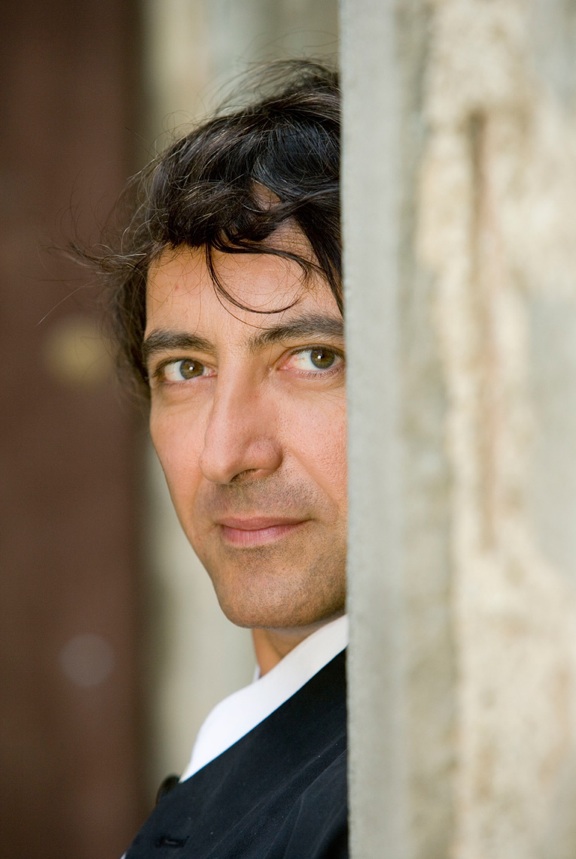
Never write off an artist because they are a late bloomer.
French pianist Jean-Efflam Bavouzet won his first competition in 1986, and quickly gained the respect of anyone who heard him play, but it took nearly two decades for the wider classical music world to fully catch on to this performer’s prodigious talents, which will be on solo display at Stratford Summer Music on Wednesday afternoon.
- Classical Music 101: What Does A Conductor Do? - June 17, 2019
- Classical Music 101 | What Does Period Instrument Mean? - May 6, 2019
- CLASSICAL MUSIC 101 | What Does It Mean To Be In Tune? - April 23, 2019
Bavouzet’s St Andrew’s Church recital is all about Impressionist master Claude Debussy, with a little bit of Joseph Haydn thrown in as an amuse-bouche.
A lot of people play Debussy and Haydn, as well as Ravel, Beethoven, Bartók and Schumann and Liszt. But very few manage a total act of self-transformation in the process.
For example, Bavouzet’s Debussy interpretations are all about depth of sound and colour, while his Ravel playing displays remarkable finesse with shimmering surfaces (“Ah, but Ravel is a classic composer, but Debussy is a revolutionary composer,” says the pianist during a post-rehearsal chat on Monday).
His Haydn has an astringent clarity about it, while Beethoven sonatas emerge with messy Sturm und Drang mixed with tenderness — much like the ink-splotched scratches that strain the composer’s manuscripts.
Unlike so many pianists — including international stars — who approach music with a personal consistency, Bavouzet takes on each composer as a separate interpretive challenge, with distinct results.
“For me, a great pianist is a pianist who can completely change his clothes,” says Bavouzet. “Of course, you can’t transform the flesh completely, but a great actor can create completely different characters,” he says by way of analogy.
He calls this a question of style, and how the performer needs to change the style of playing and approach to the keyboard. “That’s why there are a lot of composers I don’t touch at all. Chopin, Brahms, Schubert, to name a few, because I haven’t been able to find the clothes I should wear; I haven’t been able to find the sound I should have. From afar, you might think that I play everything from Haydn to Boulez, but it’s not true.”
Bavouzet says the notion of style is extremely complex. “It is a mixture of instinct and knowledge,” he explains. “The more you know about the composer, the more free you should be — not at all stuck in one aspect. It’s when you don’t know that you are clueless.”
He admits that the first time he truly felt clueless in front a piece of music was Olivier Messiaen’s Réveil des oiseaux. Fortunately, Yvonne Loriod, Messiaen’s second wife and chief interpreter of his music, was still alive. “I went up to her apartment and we had a wonderful afternoon of work together, and she explained everything to me. But without her wonderful help, I think I would have had to cancel the concert, but it was with the Boston Symphony, so it would have been a bit stupid,” he says, laughing.
“Every extra piece of historical or musicological information you can get is helpful. But it should help you to be free,” he insists.
Interestingly, it took Bavouzet a while to connect to Debussy. “I was always in love with the music of Ravel, since before I can remember,” he says. “But to be moved by Debusssy was a very, very long process. I had to wait until my mid-30s to be moved, to be emotionally touched.”
The key that unlocked that appreciation was the tower scene from Debussy’s opera Pelléas et Mélisande. He was sitting in a hotel room in Japan, preparing for his recording of the Debussy Etudes, and had brought with him a classic recording of the opera with Herbert von Karajan conducting. At that moment in the opera — “perhaps because I was away from home, I was more solitary, more perceptive” — he put the headphones on and began to cry.
“I was like a 13-year-old girl, and I couldn’t stop the crying for years,” Bavouzet admits. “But the point is, this was the result of constant work on Debussy.”
He laughs again as he recalls how, during this period of Debussian emotional vulnerability, he was put on hold while making a phone call, and a cheezy, synthesized version of the composer’s Arabesque No. 1 came on, making him burst into tears. “It was like a Pavlovian reflex, and it lasted for two years.”
Quite frankly, it sounds like Bavouzet would put even the most determined of Hollywood’s Method actors to shame.
+++
The second half of the programme is different from the one announced by Stratford Summer Music. Bavouzet is replacing first six Préludes from Book II with his own two-piano transcription of Debussy’s ballet suite, Jeux, which he has now adapted for piano solo.
This will be followed by Préludes Nos. 7 to 12. For other concert details, click here.
+++
To find out more about Bavouzet, you can visit his website here.
Here is Bavouzet playing “Reflets dans l’eau,” from Images, also on Wednesday’s programme:
John Terauds
- Classical Music 101: What Does A Conductor Do? - June 17, 2019
- Classical Music 101 | What Does Period Instrument Mean? - May 6, 2019
- CLASSICAL MUSIC 101 | What Does It Mean To Be In Tune? - April 23, 2019



